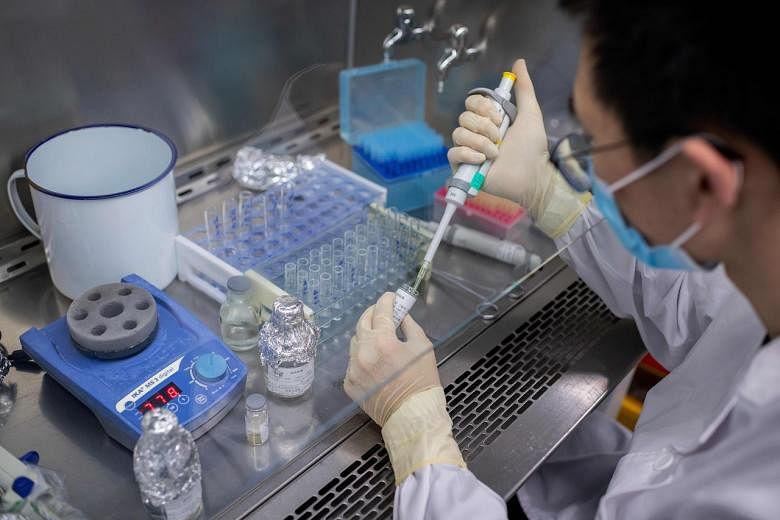WASHINGTON • In the race to develop a vaccine to end the Covid-19 pandemic, governments, charities and Big Pharma firms are sinking billions of dollars into bets with extraordinarily low odds of success.
Historically, just 6 per cent of vaccine candidates make it to market, often after a years-long process that does not draw big investments until testing shows a product is likely to work.
But the traditional rules of drug and vaccine development are being tossed aside in the face of a virus that has infected over 5.2 million people, killed more than 335,000 and devastated the global economy.
With Covid-19, the goal is to have a vaccine identified, tested and available on a scale of hundreds of millions of doses in just 12 to 18 months.
"The crisis in the world is so big that each of us will have to take maximum risk now to put this disease to a stop," said Dr Paul Stoffels, chief scientific officer of Johnson & Johnson, which has partnered the US government on a US$1 billion (S$1.4 billion) investment to speed up development and production of its still-unproven vaccine.
The Coalition for Epidemic Preparedness Innovations (Cepi) - a vaccine development consortium supported by private donors as well as Britain, Canada, Belgium, Norway, Switzerland, Germany and the Netherlands - has identified at least 115 ongoing vaccine initiatives worldwide.
Many governments are pouring money into vaccine initiatives with expectations that they will be first in line if a viable vaccine emerges.
Arcturus Therapeutics Holdings, a San Diego biotechnology company, is receiving up to US$10 million from the Singapore Government to develop its mRNA-based vaccine candidate in partnership with the Duke-NUS Medical School. If the vaccine is approved, Singapore gets first access, said Arcturus CEO Joseph Payne. Everything after that, he said, goes to "whoever pays for it".
Meanwhile, Oxford University and AstraZeneca plan to recruit around 10,000 adults and children in Britain for trials of an experimental vaccine which on Thursday received US backing worth up to US$1.2 billion.
In China, the government is backing several projects, raising the prospect it will inoculate its 1.4 billion people first.
The US Biomedical Advanced Research and Development Authority plans to invest in five vaccine candidates.
The World Health Organisation has announced a "landmark collaboration" across the international community to raise US$8 billion to accelerate vaccine development and ensure equitable access worldwide. Countries across Europe, Asia, Africa, the Middle East and the Americas announced their participation, but the US and China did not.
Having reserves ready worldwide to immediately inoculate critical populations would stamp out the pandemic faster and reignite economies, said Dr Richard Hatchett, who advised the Obama White House during the 2009 swine flu pandemic.
The alternative, said Dr Hatchett, who now heads Cepi, is a replay of past pandemics, with wealthy countries hoarding the vaccines. If that happens, pandemic experts warn, infection hot spots will continue to pop up, each with the potential to create a new wave of illness.
The only way to move on from the pandemic is to ensure equal access to a jab, said Dr David Heymann, a professor of infectious disease epidemiology at the London School of Hygiene and Tropical Medicine.
It is "important that all countries have equal risks and at the same time equal response mechanisms so that travel and trade can begin, and that can only be accomplished if everyone has the same level of protection".
REUTERS, BLOOMBERG











